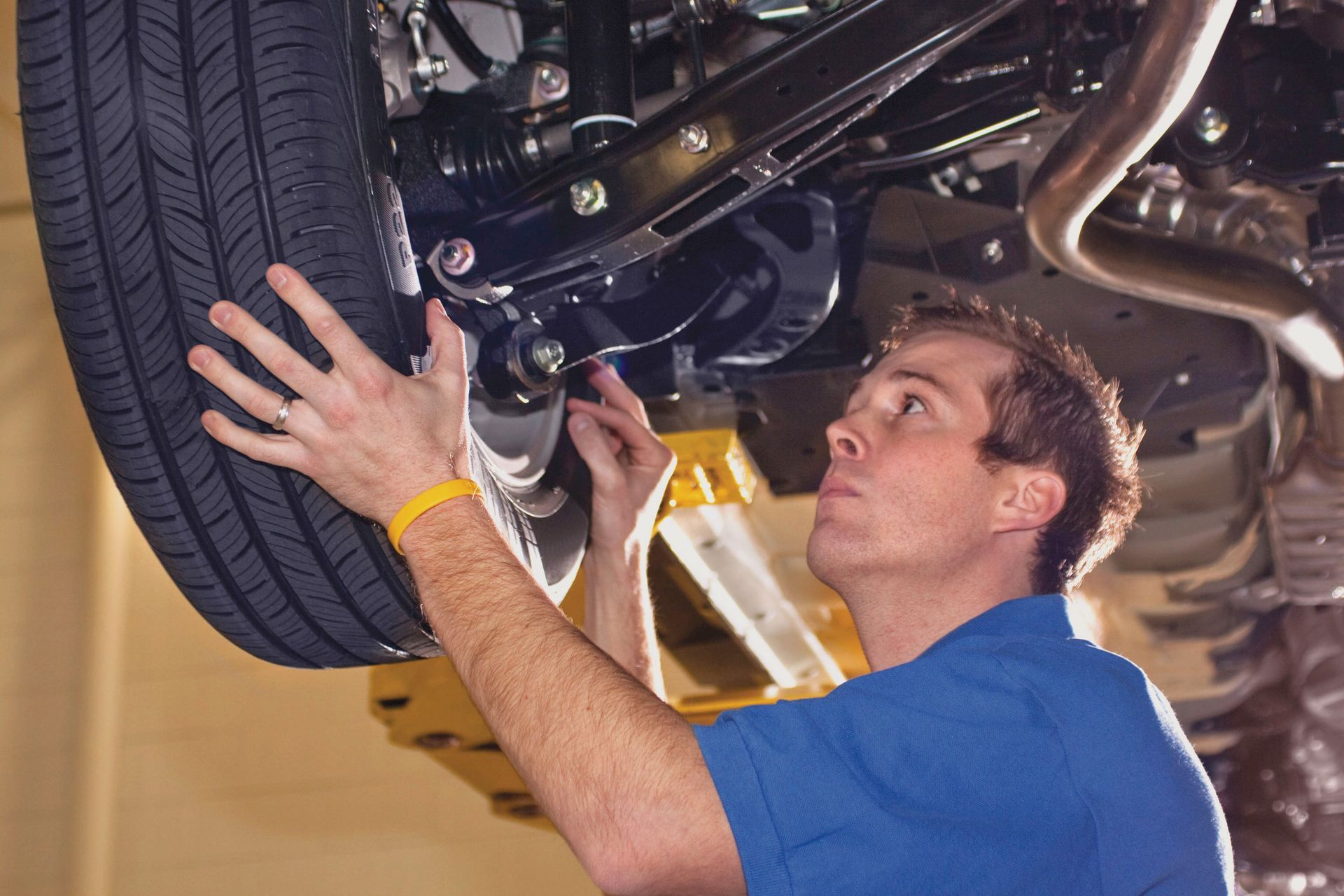November 14, 2025
This article explores essential auto repairs and maintenance practices that can greatly improve fuel efficiency. As drivers look for ways to reduce fuel costs and minimize environmental impact, understanding these key maintenance strategies becomes increasingly important. With rising gas prices and growing eco-awareness, more vehicle owners are prioritizing upkeep that delivers long-term savings. These repairs not only lower fuel consumption but also help extend the life of critical vehicle components, minimizing the need for costly replacements. By following these best practices, drivers can enhance performance, boost sustainability, and achieve greater fuel efficiency overall.
1. Maintaining Tire Condition
Maintaining the correct tire pressure is one of the simplest yet most effective ways to improve fuel efficiency. Under-inflated tires can increase rolling resistance, which means your vehicle has to work harder, leading to higher fuel consumption. According to the National Highway Traffic Safety Administration, having properly inflated tires can save drivers up to 11 cents per gallon of fuel. By ensuring tires are properly inflated, not only can fuel costs be reduced, but tire wear can also be minimized, extending the life of the tires. Regularly checking tire pressure and making required adjustments can greatly contribute to efficient fuel usage.
Proper wheel alignment ensures that the wheels are parallel to each other and make contact with the road at the correct angles. Misaligned wheels can lead to uneven tire wear, steering issues, and increased fuel consumption as the engine has to exert more effort. Correct wheel alignment enhances vehicle stability, improves safety, and optimizes fuel efficiency. It is recommended to have your vehicle's alignment checked during regular maintenance or if you notice the vehicle pulling to one side. By maintaining proper wheel alignment, you ensure good fuel economy and prolong tire life.
Tire rotation involves moving tires to different positions on a vehicle to promote even wear and extend their lifespan. Regular tire rotation is a crucial part of routine auto repairs, helping maintain balanced handling and consistent traction. When tires wear unevenly, the engine must work harder to maintain control, which can increase fuel consumption and reduce efficiency. By scheduling tire rotation as part of your ongoing repairs, you can ensure smoother performance and safer driving conditions. Consistent rotation ultimately enhances fuel economy, improves vehicle stability, and supports long-term reliability.
2. Updating Engine Components
Clean air filters play a vital role in maintaining engine efficiency and fuel consumption. A clogged or dirty air filter restricts airflow to the engine, causing it to burn more fuel than necessary. Replacing air filters at regular intervals ensures that the engine receives adequate air supply, optimizing combustion and improving fuel economy. In addition to fuel savings, clean air filters contribute to reduced emissions, thus supporting environmental sustainability. By making air filter replacement a priority, drivers can expect better performance and fuel efficiency from their vehicles.
Spark plugs are essential components that ignite the air-fuel mixture in the engine, enabling it to run efficiently. Worn or faulty spark plugs can lead to misfires, poor acceleration, and increased fuel consumption. Replacing spark plugs as part of your vehicle's maintenance schedule can enhance performance and improve miles per gallon. New spark plugs ensure smooth engine operation and efficient fuel combustion, translating into cost savings at the gas pump. Timely spark plug replacements are crucial in maintaining optimal engine performance and fuel efficiency.
Fuel injectors play a critical role in delivering precisely measured amounts of fuel to the engine for optimal combustion. Over time, deposits can accumulate inside the injectors, disrupting the spray pattern and leading to inefficient fuel delivery. Incorporating fuel injector cleaning into your routine auto repairs helps restore proper fuel flow, improve combustion balance, and lower fuel consumption. Keeping injectors clean ensures the engine runs smoothly and maintains peak performance, resulting in better fuel economy. Regular fuel injector maintenance as part of scheduled repairs is essential for preserving a clean, efficient, and long-lasting fuel system.
3. Servicing the Fuel System
Fuel filters play a key role in ensuring that only clean fuel reaches the engine, critical for efficient operation and fuel combustion. Clogged fuel filters can lead to reduced engine performance and increased fuel consumption. Regular replacement of fuel filters prevents contamination, allowing for smooth and efficient engine operation. Clean fuel filters reduce the risk of engine damage, enhancing fuel efficiency and extending the life of engine components. By including fuel filter replacement in regular vehicle maintenance, drivers promote optimal engine performance and effective fuel use.
The fuel pressure regulator maintains consistent fuel pressure to the engine, directly affecting performance and efficiency. When it malfunctions, poor fuel atomization can occur, leading to uneven combustion and higher fuel consumption. As part of routine auto repairs, regular inspection and maintenance of the fuel pressure regulator help ensure proper fuel delivery and smooth engine operation. Keeping this component in top condition supports better fuel economy, enhanced performance, and reduced emissions.
In older vehicles, the carburetor is responsible for mixing air and fuel for combustion, influencing engine efficiency and fuel consumption. Fine-tuning the carburetor ensures a balanced fuel-air ratio, leading to enhanced engine performance and improved fuel economy. Periodic carburetor adjustments help in maintaining optimal efficiency and preventing fuel-rich conditions that increase fuel consumption. Wellness checks and adjustments of the carburetor are crucial for running the vehicle smoothly and efficiently. By focusing on carburetor tuning, drivers of older vehicles can optimize fuel usage and reduce costs.
4. Checking the Electrical Systems
A well-maintained battery is essential for vehicle reliability and overall efficiency. When a battery begins to fail, it can cause starting problems, strain the alternator, and increase fuel consumption. Incorporating routine battery checks into your auto repairs helps ensure the electrical system runs smoothly, supporting optimal fuel economy and dependable performance. Cleaning terminals, checking fluid levels, and testing battery health are key steps that prevent unexpected breakdowns. By making battery maintenance a regular part of scheduled auto repairs, drivers can enjoy consistent performance, improved efficiency, and long-term reliability.
The alternator charges the battery and powers electrical systems while the vehicle is in operation, affecting fuel efficiency. A malfunctioning alternator can drain the battery, forcing the engine to work harder, increasing fuel consumption. Regular alternator testing and maintenance ensure it operates efficiently, supporting optimal battery life and fuel economy. By ensuring the alternator's performance, drivers can prevent electrical system failures and achieve cost savings. Alternator maintenance plays a vital role in sustaining vehicle efficiency and reliability.
The starter is responsible for initiating the engine's operation, influencing overall vehicle efficiency. A faulty starter can lead to increased engine workload and unnecessary fuel consumption during prolonged start attempts. Regular starter inspections and addressing issues promptly ensure that the engine starts efficiently, conserving fuel. By diagnosing and maintaining the starter in good condition, drivers can enjoy improved vehicle performance and reduced operational costs. Proactive starter inspections contribute to a reliable and economically efficient vehicle.
By performing these crucial auto repairs and maintenance tasks, vehicle owners can optimize their fuel efficiency, save on gas costs, and contribute to environmental sustainability. Regular check-ups and timely interventions are key to achieving long-term savings and ensuring a smooth-running vehicle. With proper attention to their vehicle's maintenance needs, drivers can expect enhanced performance and fuel economy. If you want to make sure your car not only stay on the road, but maintains proper fuel efficiency while doing so, contact Huntsville Discount Tires to learn more about auto repair and tire services.


